An Extreme Real World EV Driving (Charging) Test
True Long Range: 1,796 Miles and Four States in a 2023 Ford Mustang Mach-E
Ford presented a great opportunity to test the long-range suitability of the 2023 Ford Mustang Mach-E when I received an invitation to attend the Ford Bronco Off-Roadeo program in Moab, Utah.
Instead of flying from my home in Southern California, I asked if my wife and I could drive to the event. With strong encouragement and support of the Ford team, a robust charging network and a great car, the 1,796 miles was as pleasant and easy to drive as it would be in any other car. Even better than many. Go HERE for a detailed look at the Mustang Mach-E we drove on this adventure. This is some detail on the most critical part of the trip—our charging experience.
Summary
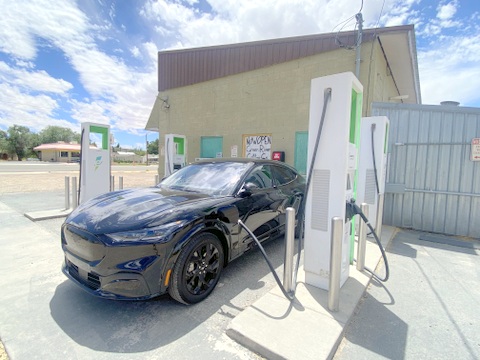
The road trip was an estimated 95-percent freeway driving, with the majority of that at 70 miles per hour or more. In Utah the posted limit is 80 mph and for many drivers that was only a suggestion. We set the cruise control to 72 mph when on the freeway. Electric vehicles are most efficient when driven in town to take advantage of the regenerative braking, or on the open road at slower speeds.
The regenerative braking and one pedal driving were set at their highest levels, and the BlueCruise hands-free driving, with adaptive cruise control and lane keeping, was used as often as possible. We estimate about 1,600 of the 1,796 miles were driven with hands off the steering wheel. This technology adds to efficiency because there is no on-and-off the accelerator pedal eliminating jerky-jerky driving. It also aids in the driver being more relaxed, especially on a long road trip like ours.
The all-electric efficiency averaged about 3.0 miles per kilowatt-hour (kWh). This is an excellent number considering the speeds, the majority being freeway driving, the terrain going from sea level to nearly 5,000 feet, running the A/C most of the time, and the Mach-E weighing 4,800 pounds. Had our time in the Mustang Mach-E been spent mostly in town or on curvy country roads, our efficiency would have been closer to 4.0 miles per kWh.
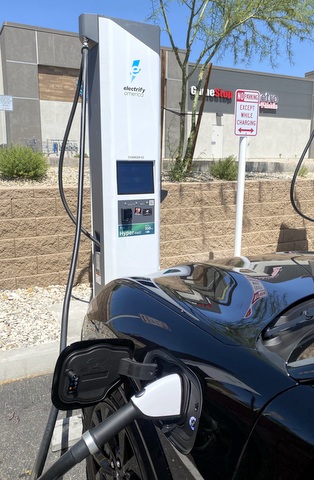
Cost Comparison
We charged 412.23 kWh over the 1,796-mile trip at an estimated retail cost of $203. A comparable SUV, such as a 2023 Ford Explorer AWD with the turbocharged 4-cylinder engine and an EPA highway rating of 26 miles per gallon, would have used 69 gallons of gasoline. The fuel costs we saw posted during our trip averaged $4 per gallon for 87 octane, which would be $276 gasoline costs, so advantage electric, but not by much.
The comparison between an electric and gasoline vehicle is more than the cost of energy used (one thing to keep in mind is the retail price of electircity at a public fast-charging site is substantially higher than the cost of electricity for home charging). Gasoline fueled vehicles require tune-ups, oil, transmission servicing and other typical maintenance and costs. The Mach-E, as well as other EVs, has an overall lower cost per mile of operation as none of those need to be done. Another cost savings is that with regenerative braking, the Mach-E won’t need brake pad replacements under normal use for at least 50,000 miles. On the other side, on a trip like this you may need to make a few more stops and take a little more time than you might with a gas vehicle, but again the difference is not great.
Range and Charging
Our Mustang Mach-E Premium AWD was equipped with the 91 kWh of usable charge extended range battery. This $7,000 option is a worthy consideration if road trips are in your plans. In our case it was as, traveling through four states, California, Nevada, Arizona and Utah, having the extended battery made the trip worry-free.
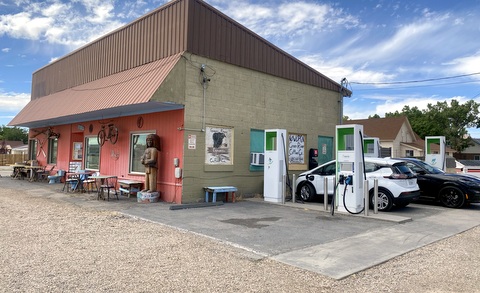
The EPA rating of 290 miles of all-electric range (AER) is an important reason why the Mach-E AWD Extended is worthy of no fear road trips outside your city or region. If you opt for the rear wheel drive Mach-E Extended the AER increases to 310 miles. The base rear wheel drive Mach-E, without the extended battery, has an AER of 247 miles.
We began by downloading the FordPass app that maps routes, finds chargers, and is used for many other vehicle operations. After creating an account and registering your Mach-E, the FordPass app can then start and stop, lock and unlock and locate a lost vehicle.
For charging we used the BlueOval Charge Network and Electrify America charge stations, where new Mach-E (and F-150 Lightning) owners receive 250 kWh of complimentary charging, the equivalent of a little more than half our trip.
Here’s the day-by-day run down.
Driving: Day 1
We departed Dana Point, California, with 280 miles all-electric range (AER) and a 97% state of charge, (SOC.) Since it was our first time driving the Mach-E on a long distance trip, we decided to break-up the first day into three segments. Dana Point to Barstow; Barstow to Las Vegas, Nevada; and Las Vegas to St. George, Utah. These were our charging stops, with mileage, range and state of charge (SOC), before and after charging.
Dana Point, California, to Barstow, California (130 miles)
- SOC on arrival: 52%
- AER remaining: 142 miles
- SOC on departure: 96%
- AER: 280 miles
- Charging Time: 41 minutes
- Kilowatt-hours added: 43.9
- Approximate Cost: $20.64
- Efficiency: 3.1 miles per kilowatt-hour (kWh)
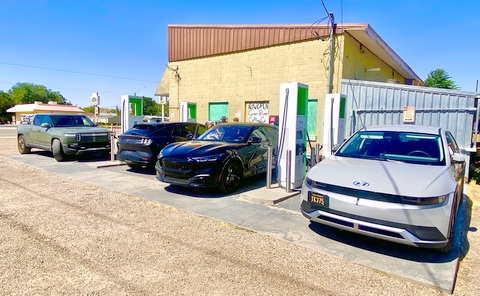
Barstow-to-North Las Vegas, Nevada (162 miles)
- SOC on arrival: 43%
- AER remaining: 116 miles
- SOC on departure: 71%
- AER: 198 miles
- Charging time: 54 minutes
- KWh added: 27.6
- Approximate Cost: $12.96
- Efficiency: 3.1 miles/kWh
North Las Vegas-to-St. George, Utah (116 miles)
- SOC on arrival: 29%
- AER remaining: 76 miles
- SOC on departure: 98%
- AER: 272 miles
- Charging time: 1 hour, 6 minutes
- KWh added: 69.6
- Approximate cost: $35.34
- Efficiency: 3.0 miles/kWh
Day 2
Departing St. George, our end destination of Moab was 339 miles away.
St. George-to-Salina, Utah (178 miles)
- SOC on arrival: 31%
- AER remaining: 78 miles
- SOC on departure: 92%
- AER: 247 miles
- Charging time: 47 minutes
- KWh added: 34.4
- Approximate cost: $17.67
- Efficiency: 2.8 miles/kWh
Salina-to-Green River, Utah (105 miles)
- SOC on arrival: 61%
- AER remaining: 157 miles
- SOC on departure: 93%
- AER: 247 miles
- Charging time: 34 minutes
- KWh added: 61.5
- Approximate cost: $31.24
- Efficiency: 3.0 miles/kWh
Driving: Day 3
After two nights at the Red Cliff Lodge in Moab and experiencing the Bronco Sport Off-Roadeo program, we began the return trip with enough battery and range to drive round trip to Moab and recharge again in Green River. Note: The only public chargers in Moab were Tesla Superchargers, which Ford EV owners will soon have access to.
Green River-to-Moab-to-Green River (119 miles)
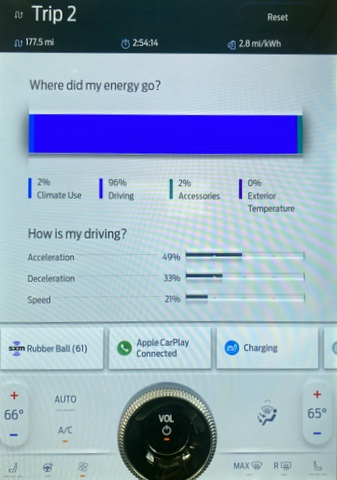
- SOC on arrival: 39%
- AER remaining: 101 miles
- SOC on departure: 89%
- AER: 238 miles
- Charging time: 41 minutes
- KWh added: 54.3
- Approximate cost: $27.66
- Efficiency: 3.0 miles/kWh
Green River-to-Salina (105 miles)
- SOC on arrival: 42%
- AER remaining: 103 miles
- SOC on departure: 97%
- AER: 250 miles
- Charging time: 51 minutes
- KWh added: 50.1
- Approximate cost: $24.64
- Efficiency: 3.0 miles/kWh
Salina-to-St. George (183 miles)
- SOC on arrival: 29%
- AER remaining: 74 miles
- SOC on departure: 95%
- AER: 240 miles
- Charging time: 49 minutes
- KWh added: 54.2
- Approximate cost: $27.66
- Efficiency: 3.1 miles/kWh
Driving: Day 4
St. George-to-Las Vegas (125 miles)
- SOC on arrival: 48%
- AER remaining: 118 miles
- SOC on departure: 97%
- AER: 251 miles
- Charging time: 49 minutes
- KWh added: 48.2
- Approximate cost: $23.04
- Efficiency: 3.0 miles/kWh
Las Vegas-to-Hesperia, CA (197 miles)
- SOC on arrival: 29%
- AER remaining: 74 miles
- SOC on departure: 95%
- AER: 240 miles
- Charging time: 49 minutes
- KWh added: 68.8
- Approximate cost: $32.64
- Efficiency: 3.1 miles/kWh
Hesperia-to-Dana Point (104 miles)
- SOC on arrival: 40%
- AER remaining: 136 miles
- Efficiency: 3.1 miles/kWh
Charging Summary
The FordPass and BlueOval apps allow for Ford’s two current EVs, the Mach-E and F-150 Lightning, to be charged at most charging networks without needing to log in or pay on the spot.
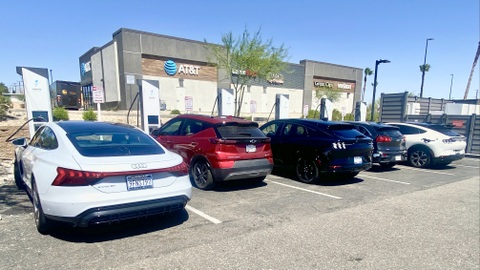
We used Electrify America exclusively as they had a well-developed charging network for our journey. For convenience, they have partnered with Ford as part of Ford’s Plug & Charge program, where all we needed to do was plug in the charger, and once our Mach-E was recognized in the system, charging began. There were no account ID, pins or passwords to enter and no payment due. Ford will be introducing this fast and simple charging process to ChargePoint and EVGO.
The Electrify America chargers, with only a couple of exceptions, were all operational at each stop we made. We always had a choice to charge at either a 150 kWh or 350 kWh unit, but with 145 kWh our fastest charge speed, using the 350 kWh charger was not a priority.
The big news from Ford is their EV owners, beginning in January 2024, will receive an adapter allowing them to charge at Tesla Superchargers. This opens an additional 1,200 charging points, which will make owning and traveling with a Ford EV even more convenient. Starting in 2025, all Ford EVs will come with Tesla’s North American Charging Standard (NACS) plug, so no adapter will be necessary. Ford currently uses the Combined Charging Standard (CCS) connector, which will be phased out in the next couple of years.
The Charging Community
There is a camaraderie among EV owners when meeting at charging stations. All know what each other is going through and what it takes to continue on their journey. There is a positive, universal attitude that was calm and positive. All knew, before beginning their journey, that charging was not as fast as filling a tank with gasoline. All seem perfectly comfortable in the shared experience.
In 1966, Honda’s marketing slogan for its motorcycles was: “You meet the nicest people on a Honda.” Paraphrasing, and with all credit to their copywriters nearly 60 years ago, it should be updated to “You meet the nicest people when charging your EV.”
Conclusion
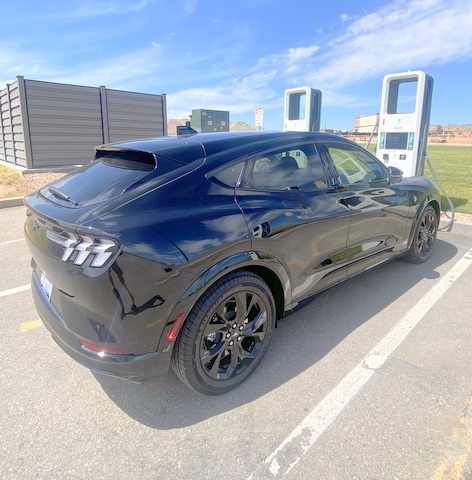
A robust and highly developed public charging network will be crucial for mass acceptance of electric vehicles. California has the most built-up public charging network, which is one of the reasons why more EVs are sold there than all the other states combined.
Long distance drives can be done with the Ford Mustang Mach-E without any problems. The 1,796 miles we drove were only the beginning, because with planning we could have continued driving across America.
Make sure to opt-in to the Clean Fleet Report newsletter (top right of page) to be notified of all new stories and vehicle reviews.
Story and photos by John Faulkner.
Disclosure:
Clean Fleet Report is loaned free test vehicles from automakers to evaluate, typically for a week at a time. Our road tests are based on this one-week drive of a new vehicle. Because of this we don’t address issues such as long-term reliability or total cost of ownership. In addition, we are often invited to manufacturer events highlighting new vehicles or technology. As part of these events we may be offered free transportation, lodging or meals. We do our best to present our unvarnished evaluations of vehicles and news irrespective of these inducements.
Our focus is on vehicles that offer the best fuel economy in their class, which leads us to emphasize electric cars, plug-in hybrids, hybrids and diesels. We also feature those efficient gas-powered vehicles that are among the top mpg vehicles in their class. In addition, we aim to offer reviews and news on advanced technology and the alternative fuel vehicle market. We welcome any feedback from vehicle owners and are dedicated to providing a forum for alternative viewpoints. Please let us know your views at publisher@cleanfleetreport.com.

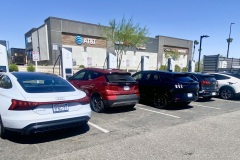
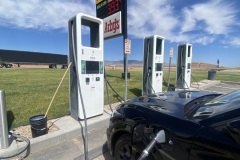
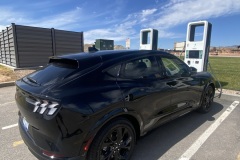
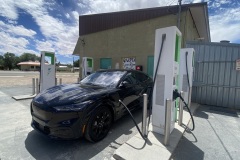
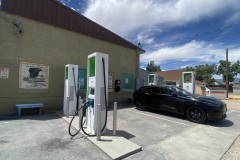
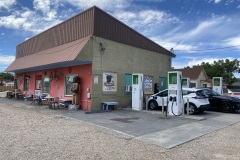
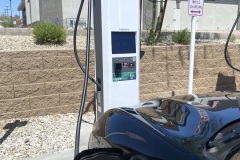
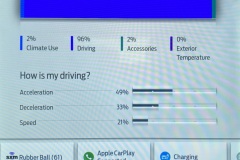
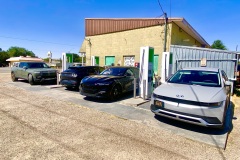
6 thoughts on “An Extreme Real World EV Driving (Charging) Test”